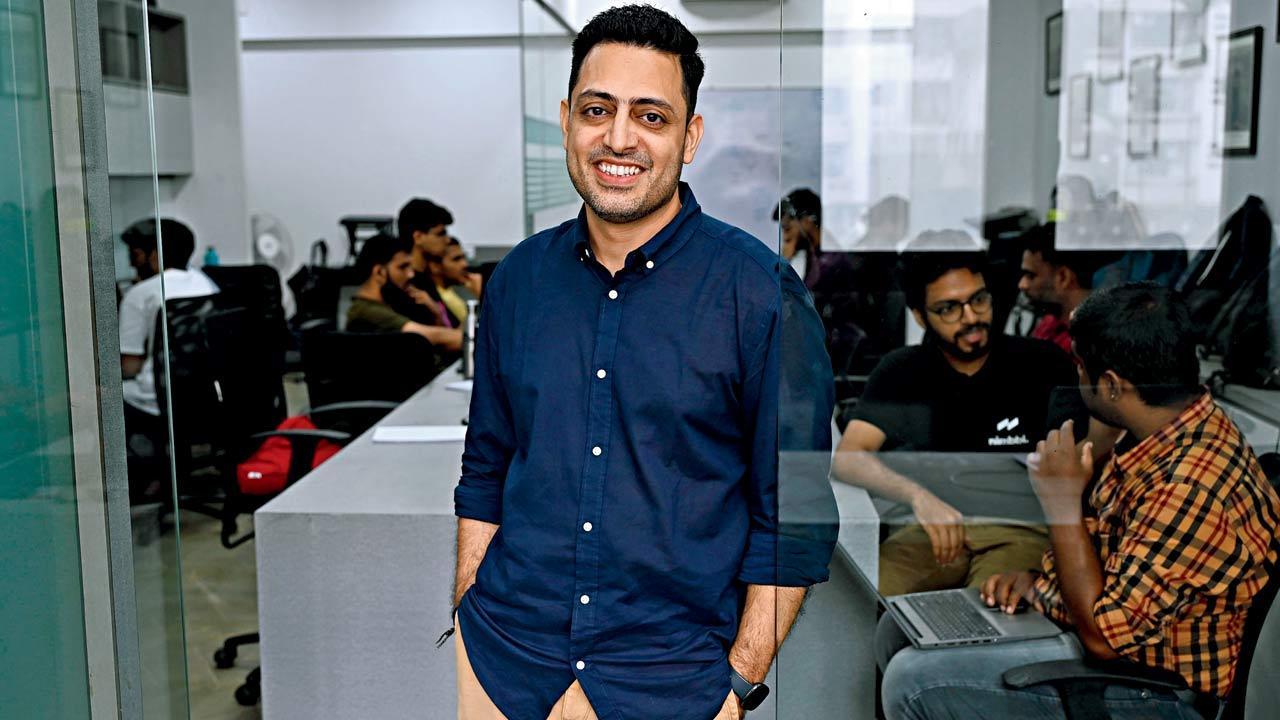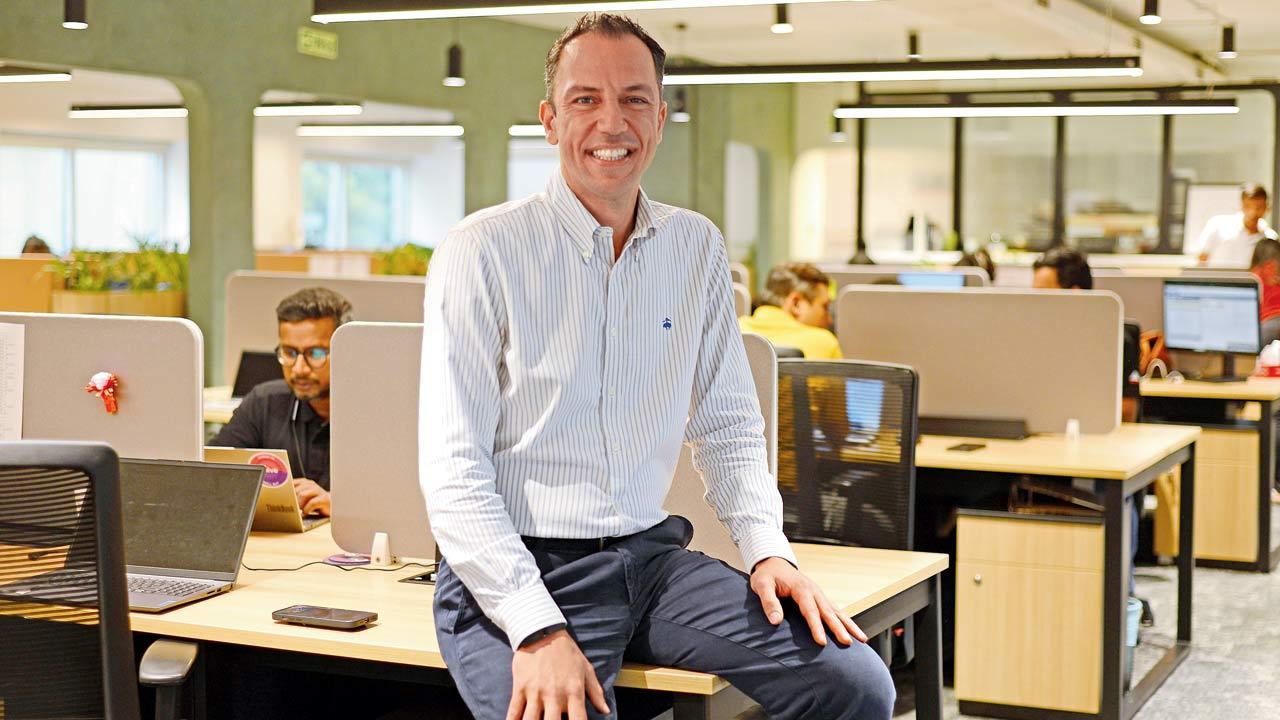Strong investor presence, good work culture and ease of business—financial capital Mumbai has plenty going for it in the race to become a fintech hub

Anurag Pandey, co-founder of Mumbai-based fintech company Nimbbl. Pic/Kirti Surve
The question of which Indian metropolis is the best for infrastructure, food, safety, and more has been a long-running debate. Last week, when Prime Minister Narendra Modi shared his vision for making Mumbai the global fintech capital, it stirred the discussion anew among startups and entrepreneurs, with many drawing a direct comparison between the country’s financial capital and IT hub Bengaluru.
ADVERTISEMENT
Fuelling the debate further, on July 17, the Karnataka government tabled a controversial job reservation bill, which mandates that 50 per cent of management positions and 70 per cent of other roles in private companies be reserved for locals. With the PM’s push for Mumbai, and dissent among tech CEOs over Karnataka’s new bill, an interesting question arises—is it this city’s time to shine as the go-to hub for fintech and startups?
There’s no denying that Mumbai has some catching up to do. According to a report by startup analysis platform Inc42, over 60 per cent of all startup funding in India goes to firms in Bengaluru. In 2023, Bengaluru’s startups received a total funding of $4.2 billion (Rs 420 crore), whereas Mumbai received $1.5 billion (R150 crore).
 Kahraman Yigit, CEO and co-founder of Olive Living, says the cost of office space, and overall living expenses are both higher in Mumbai
Kahraman Yigit, CEO and co-founder of Olive Living, says the cost of office space, and overall living expenses are both higher in Mumbai
In February, Unacademy co-founder and CEO Gaurav Munjal had said in a post on X, “Mumbai and Delhi cannot become tech hubs how much ever people try…Bangalore is the place to be if you’re starting up. Don’t even think about any other place.”
Not all agree with this argument, though.
Anurag Pandey, co-founder of the Mumbai-based fintech company Nimbbl, says, “I think Mumbai is far better in terms of the work culture than other cities. While Mumbai may not be the leader in tech startups nationally, it is the front-runner in many industries such as banking, finance, retail, media and entertainment.”
Mentioning successful startups based out of Mumbai such as Dream11, Nykaa and bookmyshow, he says, “The city has nothing lacking to become a global fintech ecosystem leader. It has all the large banks, insurance companies, wealth and investment funds and their respective regulators. The tech talent in the region (MMR & Pune) has also grown significantly in the last 10 years.”As for the ease of networking in the city, he says that just like Bengaluru, Mumbai too has WhatsApp communities to promote the exchange of ideas and kick off collaborations. “One of the many startup cliques in the city is the Mumbai Fintech WhatsApp group, which facilitates essential networking and mutually beneficial relationships,” he says.
 Samriddhi Pandey, founder and CEO of Mumbai-based startup Defy Aerospace
Samriddhi Pandey, founder and CEO of Mumbai-based startup Defy Aerospace
Startups don’t have a fully developed business model and, more crucially, they lack adequate capital. Hence, the role of the community around such ventures is crucial to take the business to the next phase. Kahraman Yigit, CEO and co-founder of Olive Living, a co-living startup based out of Bengaluru, highlights how the startup ecosystem in Karnataka’s capital has thrived primarily due to its roots in the tech industry. “Mumbai is a finance, films, and media-heavy city,” he says, adding, “The work culture in the two cities varies. Bengaluru, with its global R&D centres and MNCs, is a natural extension for AI and tech startups. It fosters synergy among such ventures.”
Many point out that higher office rental rates and cost of living are another strike against Mumbai. Real estate agency owner Vishal Wadhwani, who specialises in international real estate, says, “Rental rates in Mumbai range from Rs 300-500 per sq ft. In Bengaluru, it’s Rs 75-100 per sq ft. And in Hyderabad, it’s R50 per sq ft. The numbers speak for themselves; that’s why there are fewer startups in Mumbai.”
Abhishant Pant, the founder of Mumbai-based The Fintech Meetup—India’s largest fintech ecosystem with over 1,000 founders, over 30 banking, financial services and insurance institutions, and over 50 venture capitalists—agrees with Wadhwani.
 Abhishant Pant; (right) Aishvary Singh, vice-president at Square Yards
Abhishant Pant; (right) Aishvary Singh, vice-president at Square Yards
Office space for each employee costs up to Rs 20,000 in Mumbai, says Pant. On the other hand, he adds, in Bengaluru, office spaces in Indiranagar and Koramangala cost Rs 8,000 to Rs 10,000 per seat. “From Fort to Andheri, the cost per seat is between Rs 18,000 and Rs 20,000, making it R1 lakh per month for five people. In contrast, in Pune, you can accommodate 25 people for R1.15 lakh per month,” he explains.
With a dearth of in-house tech talent, an essential component for fintech, manpower has to be relocated from other cities, which increases costs, adds Pant. He emphasises that new engineering talent is not drawn to Mumbai as the starting salaries do not match the cost of living here.
Instead, Pant backs Pune as a reasonable alternative. He gives the example of credit card company OneCard, a unicorn that was originally founded in Mumbai, but later moved to Pune, which boasts a large tech talent pool in areas like Hinjewadi, Kharadi, and Magarpatta. “Over the last four to five years, Pune has emerged as a startup city, attracting those who are not convinced by Mumbai due to its high costs,” he adds.
Aishvary Singh, vice-president at Square Yards, says Bengaluru is decades ahead in terms of tech investment, and affordability is a major plus too. “The cost of failing in Bengaluru is much less than the cost of failing in Mumbai. Startups need time to figure out which models may work for them. The city [Bengaluru] is generous in terms of allowing multiple attempts to startups, which makes it unique.”
Samriddhi Pandey, founder and CEO of Jogeshwari-based drone company Defy Aerospace, argues that Mumbai’s ecosystem has a lot to offer. “The advantage of being in Mumbai is that a lot of investors are based here. Also, a lot of universities for [research and training] partnerships are at hand here, too.”
“For a hardware-based company like mine, engineers prefer Mumbai more than any other city,” she adds.
As for ease of doing business, Samriddhi feels it’s a cakewalk in Maharashtra. “From state taxes to company registrations, and even regulatory norms, the Maharashtra government is very supportive. I know of people in Bengaluru who complain of these processes not being as smooth,” she says.
The aeronautical engineer feels Mumbai’s work culture is a mix of the professionalism of Dubai and the relaxed vibe of Goa.
What steps can Mumbai take to attract more startups? Turns out, the Maharashtra government already had the right idea back in 2018, when it launched the Mumbai Fintech Hub. The scheme had offered reimbursements of R10 lakh annually to startups in 2019 and 2020. However, the programme faltered following a change in government.
Pant, who was a part of the initiative, believes that the only way to make Mumbai a fintech hub is to revive it and attract the right tech talent. “Currently, 90 per cent of venture capitalists have moved to Bengaluru from Mumbai. The government needs to revisit its strategy to foster a thriving fintech ecosystem in Mumbai,” he explains.
However, a top Maharashtra government official says that the focus should not only be on Mumbai but each city in Maharashtra. “Maharashtra leads the country for number of registered startups. The focus should be not on just Mumbai but the other smaller cities and towns too. Each city has its unique ecosystem when it comes to startups,” he told us.
The official also noted that a majority of the startups based out of Mumbai are mostly profitable, unlike in Bengaluru.
Rs 150cr
Total funding for Mumbai startups in 2023
Rs 420cr
Total funding for Bengaluru startups in 2023
 Subscribe today by clicking the link and stay updated with the latest news!" Click here!
Subscribe today by clicking the link and stay updated with the latest news!" Click here!







